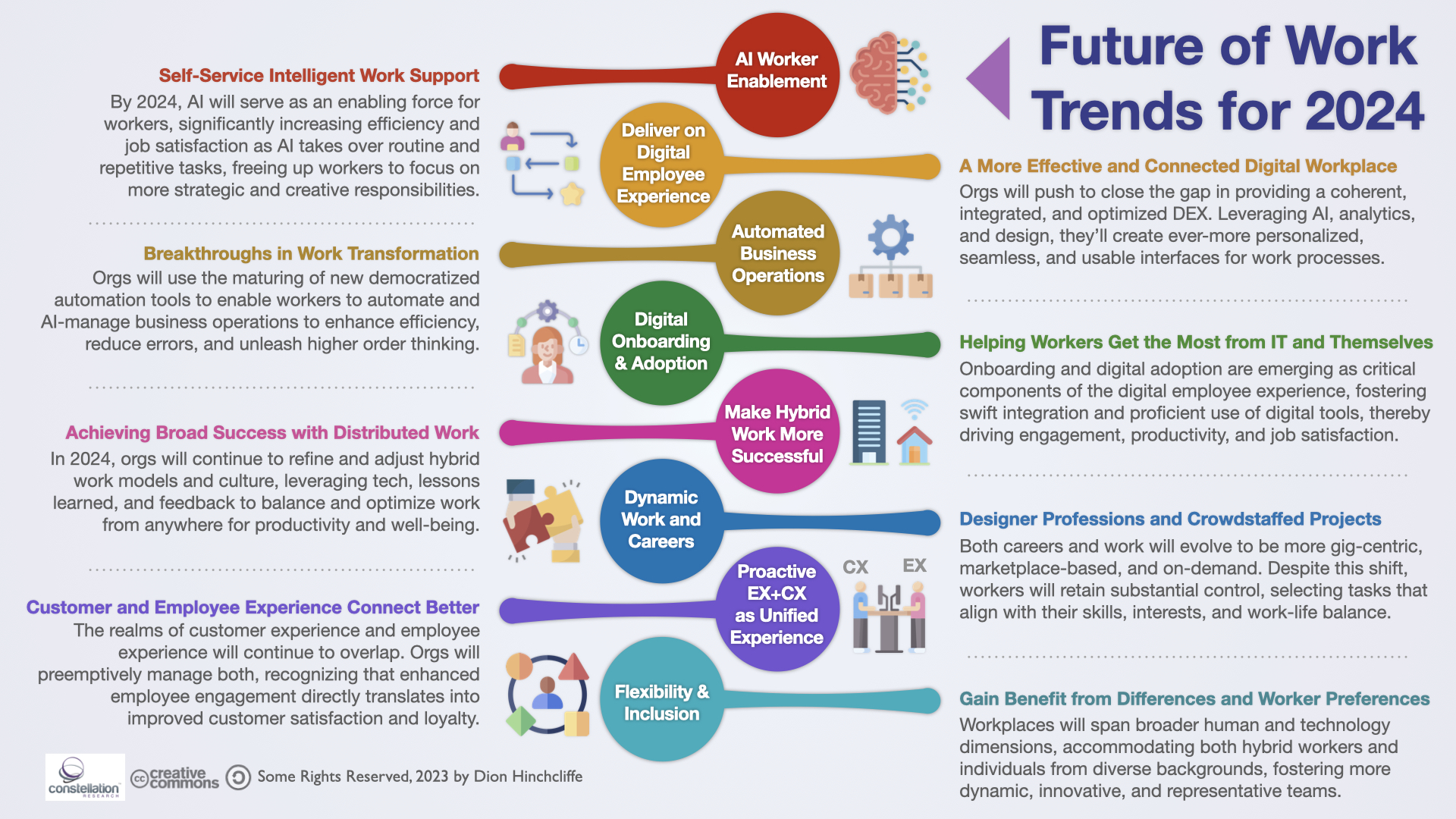The year 2023 witnessed significant shifts in the landscape of the modern workplace. Several trends have reshaped how employees and organizations operate, from the integration of artificial intelligence (AI) to the resurgence of hybrid work models.
Artificial Intelligence a mainstream player
Artificial Intelligence (AI) took center stage in 2023, marking a workplace evolution. The launch of ChatGPT in November 2022 catapulted AI into the mainstream, with over 100 million users embracing this transformative technology by January. Despite initial concerns about job displacement, experts believe AI proficiency will soon be as common as basic computer skills.
Dr. Sandra Peter, the director of Sydney Executive Plus at the University of Sydney, likens AI adoption to integrating word processors and spell checkers. Jobseekers have already begun utilizing AI to enhance their resumes, cover letters, and interview preparation. As automation takes over routine tasks, soft skills such as problem-solving, creativity, and inclusion are poised to become increasingly valuable.
Cayla Dengate, news editor at LinkedIn Australia, advises individuals aiming for success in an AI-driven future to focus on honing these essential soft skills. Nonetheless, concerns about the ethical implications of AI persist. AI’s ability to automate certain tasks may intensify job demands, raising questions about responsible usage. To address these concerns, education and robust policies are vital in curbing AI’s irresponsible use in the workplace.
Hybrid work a post-pandemic transition
The workplace transformed in response to the COVID-19 pandemic. While remote work initially gained traction, 2023 saw a resurgence of hybrid work models. In October, a KPMG survey of more than 1300 chief executives predicted the gradual eradication of working from home over the next three years.
Younger workers, who require mentorship and feedback, were among the primary beneficiaries of the return to office spaces. Workplace dynamics evolved, emphasizing the importance of connecting with colleagues and fostering bonding experiences. In this evolving landscape, the workplace is no longer solely a place to complete tasks but a space for building relationships and nurturing personal growth.
The decline of corporate jargon
2023 brought a shift away from corporate jargon, a trend that has been gaining momentum for several years. The younger generations, particularly Gen Z and Millennials, played a pivotal role in challenging and reducing the use of workplace buzzwords. A global report from LinkedIn in June revealed that 60% of Gen Z and 65% of Millennials expressed a desire to eliminate or reduce workplace jargon.
The proliferation of remote work exacerbated the issue, making corporate buzzwords a barrier to effective communication. For remote workers, the prevalence of such jargon contributed to feelings of exclusion and hindered mutual understanding. While some argue that these buzzwords help teams feel aligned, the prevailing sentiment is that they can isolate those not well-versed in the language.
Wellbeing: Balancing personal and professional lives
2023 witnessed a growing focus on employee wellbeing. Personal and professional lives became increasingly intertwined, prompting organizations to take a more holistic approach to support their employees. Psychosocial risk claims and work absences due to stress and exhaustion prompted a reevaluation of workplace policies.
The pandemic played a significant role in this shift, prompting individuals to reflect on the significance of their work and its alignment with personal values. Organizations responded by adopting stronger stances on social issues, fostering a sense of mission alignment between employees and the workplace. While initiatives like breathwork and nutrition seminars have been introduced, there is a growing recognition that well-being solutions must extend beyond individual efforts.
Ananya Johnson, Associate Professor at the University of Sydney’s business school, advocates for a closer examination of how work is designed and the feedback mechanisms in place. Addressing workload issues is imperative, as it directly impacts employee well-being. Organizations must strive to ensure that employees have manageable workloads and sufficient support.
Compensation for job interviews
Recognizing the effort involved in job interviews, some organizations started compensating applicants for their time during the interview process. This concept gained traction abroad, with Canadian organization FoodShare offering CAD 75 per interview and the UK’s Zero Waste Club compensating workers with $275 for participating in a two to three-hour workshop.
Cayla Dengate believes that this trend will catch on in Australia in 2024. Beyond leveling the playing field, compensating candidates acknowledges the importance of their time and value. It also encourages organizations to be more precise in their hiring processes, reducing unnecessary rounds of interviews and applicant evaluations.





